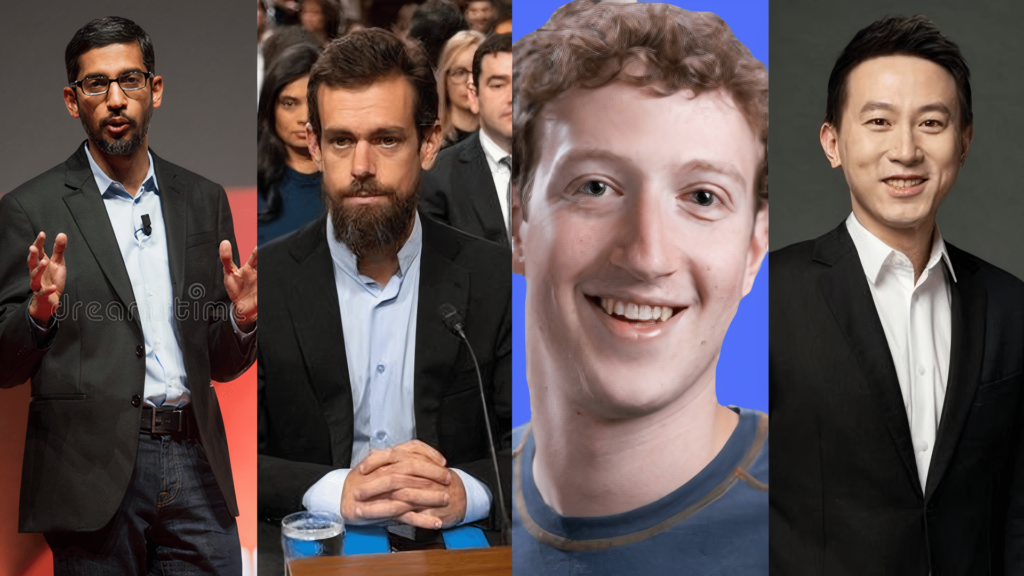Big Tech has teamed together to announce their commitments to increased women’s safety on their platforms. Google, which owns Youtube, Facebook which owns Instagram, Twitter, and Tiktok have publicized their cross-platform collaboration to combat online harassment. The non-profit organization, the Web Foundation, works with the companies to provide enhanced controls and strengthened systems for reporting abuse and safeguarding women. But with a history of sweeping statements and a lack of follow through, these commitments might be too good to be true.

Open Letter to CEO’s of Facebook, Google, TikTok, and Twitter
This week at the Generation Equality Forum in Paris, over 200 prominent women called for major technology companies to tackle what they termed, “the pandemic of online abuse against women and girls”. Several signatories include Julia Gillard, former prime minister of Australia; Graça Machel, the humanitarian and former first lady of South Africa; Kathryn D Sullivan, a US astronaut; actor Emma Watson and many others.
In their letter, they state, “The internet is the town square of the 21st century”. It is where debate takes place, communities are built, products are sold, and reputations are made. But the scale of online abuse means that, for too many women, these digital town squares are unsafe. This is a threat to progress on gender equality.” Women are already held under intense scrutiny, and this problem is exacerbated by the internet and online attackers hiding behind their screens.
One of the signatories, Diane Abbott, the first Black woman elected into British Parliament, voiced her opinion on the online harassment of women when stating, “There’s always been an undercurrent of racism and misogyny. But social media has made everything so much worse.”
Online Harassment and Threats to Women’s Safety
A 2020 Economist study, found that 38% of women globally have experienced direct online abuse. They also found that 85% of women witnessed online violence against other women. These acts of violence include threats of physical or sexual violence, harmful comments on physical appearance, doxing, misogynistic comments, and sexual harassment.
The World Economic Forum’s “Advancing Digital Safety: A Framework to Align Global Action” report found 75% of experts in several fields agree or strongly agree, that platforms do not adequately combat the spread of harmful content.

In 2018, Amnesty International looked into abuse against female politicians and journalists on Twitter. The report found that Black women were 84% more likely than white women to be harassed online. Diane Abbot, the aforementioned first Black woman elected into British Parliament, commented on the online abuse of Black women, and theorized that the harassment placed on Black women could impact gender disparity in politics. “I think it puts off younger women from coming into politics because they don’t feel they can take that level of abuse,” Ms. Abbott said. Similar problems have been plaguing several industries as online harassment knows no bounds.
ADVERTISEMENT
Recently, English Soccer stars crafted their own open letter to technology companies asking for non-performative steps to decrease online harassment. Richard Master, the Chief Executive of the Premier League; Trevor Birch, the CEO of English Football League; Kelly Simmons, the Director of Women’s Professional Game; and many others published their open letter to Facebook and Twitter in February 2021 to call for action against online abusers. Many players, team executives, referees, female commentators, and others have been targets of several abuse scandals.
The signatories stated, “The reality is your platforms remain havens for abuse. Your inaction has created the belief in the minds of the anonymous perpetrators that they are beyond reach.” Unsurprisingly, no action was taken to combat online harassment, sexism, and racism in the sports industry.
The Commitment to Women’s Safety
Facebook, Twitter, and Google have not made specific pledges about their new tools to help enact women’s safety. However, Tiktok is implementing tools that track reports of abuse, as early as the next few months.
Prototypes are currently being researched by Facebook, to make changes to their already existing reporting tools. Cindy Southworth, Facebook’s global head of women’s safety, has stated, “I’m looking forward to taking these prototypes and spending some time comparing what we already have in place, and then seeing where the gaps are. And I think most of our gaps are going to be communications”. However, as the company has claimed to consider these efforts before, it is unclear what is actually being implemented to help combat online harassment.
Azmina Dhrodia, a Web Foundation senior policy advisor on gender and data rights, stated the improvements include the ability to track reports and provided much-needed context. Dhrodia also stated the importance of “the intersectional nature of online abuse and how women of color, and Black women, in particular, LGBTQ folks, those groups are disproportionately impacted by online abuse because they’re not only facing gendered based attacks, they’re facing attacks based on other aspects of their identity”. This intersectional approach to online safety is refreshing and sorely needed.

However, these commitments need to be monitored, as companies have a history of providing sweeping statements and no follow-through. But for everyone’s sake, I hope the vague uplifting commitments are more than charged words and performative wokeness, that is a front meant to satiate the masses and amount to nothing.
ADVERTISEMENT
Vague Implementation Plans Spark Criticism
The timeline taken by the tech giants’ companies is not public yet, causing concern among skeptics. However, they have provided a statement promoting, “[The] balance of being really ambitious about this, making sure that this is their top priority, while also being realistic”.
Brianna Wu, a prominent target of Gamergate, the notorious organized online violence against women in the video game industry, is not taking the tech companies too seriously as she has seen their negligence before. In 2014, anonymous users posted Wu’s address and other personal information on a message board resulting in death threats, rape threats, and other forms of online harassment forcing Wu to flee her home. “If you’re not committing to measuring outcomes, I don’t think you’re serious,” she said.
The doctoral candidate at the University of Pennsylvania’s Annenberg School for Communication, comments on the vague commitments saying, “People draw attention to it, and the sites take initiative that are helpful but have very limited utility over time, and then problems persist, and then there’s media exposure, and then the site takes sort of a limited measure. That’s one of my primary concerns with the pledge: it just fits into this broader narrative of weak responses that aren’t upheld over time.”
The 200 female signatories that co-signed the open letter to the industries biggest tech giants urge audiences to “Imagine what you can achieve if you follow through on commitments to build safer platforms: an online world where a journalist can engage with feedback on her reporting, not assassinations of her character. Where a politician may read complaints about her policies, but not threats of rape and murder. Where a young woman can share what she wants to on her terms, knowing there are systems to keep her safe and hold harassers accountable.” The commitments made by Facebook, Google, Twitter, and Tiktok are the first step of many in the movement to hold platforms accountable for perpetuating environments of abuse. Only time will tell if the companies are working adamantly and advantageously to support women’s safety and if they’re not I’m sure that the younger generations will deviate from the norms of the past to phase out companies working against their interests and support platforms that support them. It’s only a matter of time.









